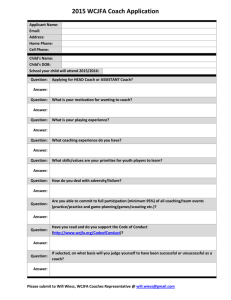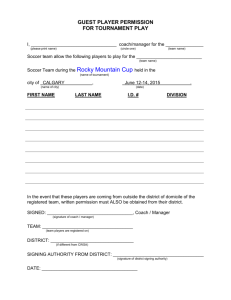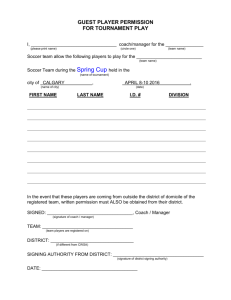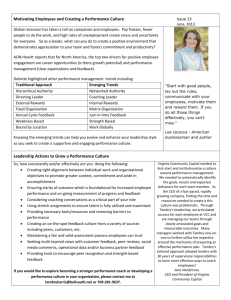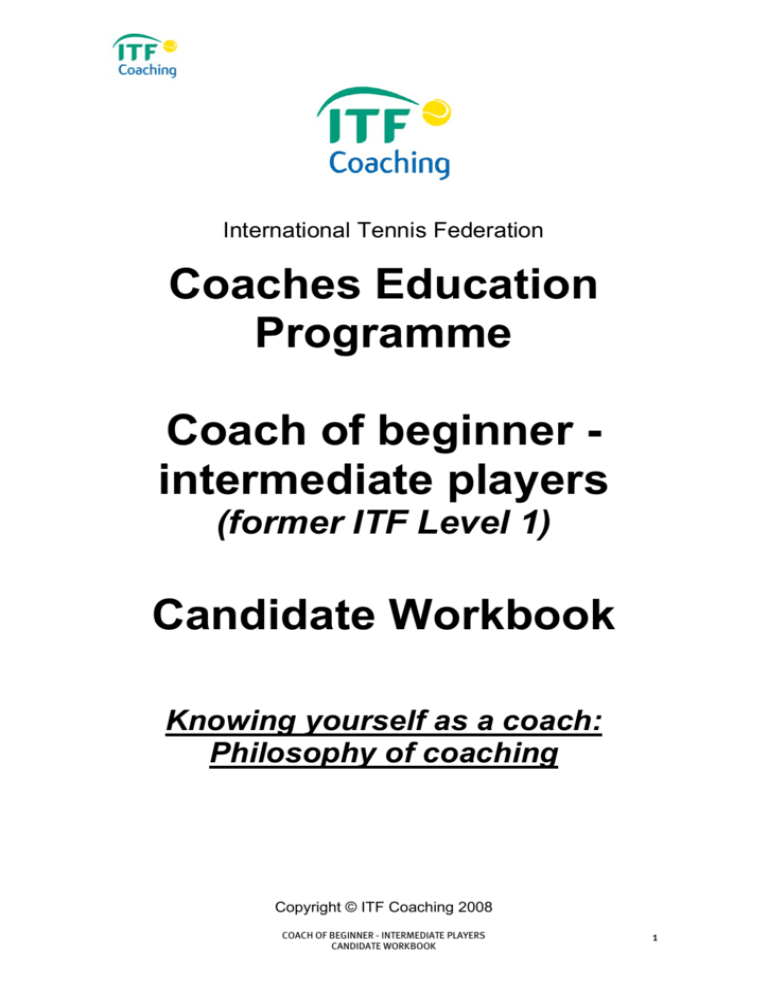
International Tennis Federation
Coaches Education
Programme
Coach of beginner intermediate players
(former ITF Level 1)
Candidate Workbook
Knowing yourself as a coach:
Philosophy of coaching
Copyright © ITF Coaching 2008
COACH OF BEGINNER - INTERMEDIATE PLAYERS
CANDIDATE WORKBOOK
1
All rights reserved. The reproduction or utilisation of this work in any form or by electronic,
mechanical, or other means not known or hereafter invented, including photocopying,
xerography, and recording, or in any information storage and retrieval system, is forbidden
without written consent and permission of ITF. This permission should be sought by contacting
ITF Coaching.
Written by Miguel Crespo
ITF Coaching
Bank Lane Roehampton
London SW15 5XZ
coaching@itftennis.com
www.itftennis.com/coaching
Tel./Fax. 34 96 34 61 90
Disclaimer
Whilst care has been taken in the preparation of this workbook the ITF and the contributing
authors do not accept any responsibility for any loss, damage or injury caused directly or
indirectly by, through, or in connection with, any drill, skill, action, instruction or suggestion
depicted in this workbook. Coaches, players and others undertake any drill, skill or action at
their own risk.
How to use this workbook
This workbook has been designed to assist you on your journey to becoming an ITF Coach of
beginner and intermediate players of the activities you will cover during the course on-court
sessions is outlined in this workbook. There are also sections where you can reflect on your
coaching knowledge and skills and how you think you are going at different stages of the course.
The ITF Coach of beginner and intermediate players’ course is made up of four units. The
assessment tasks for many of the units have been integrated (that is, several performance
criteria from several units are assessed at the same time). This Off-Court Workbook focuses
on all units of competency.
You will be required to bring this workbook to all on- and off-court sessions and it should serve
as a useful resource in completing your course assessment tasks and during your coaching
career.
PERSONAL DATA
Name:
Contact details:
- e-mail:
- phone:
Course venue:
Course dates:
Course tutors:
COACH OF BEGINNER - INTERMEDIATE PLAYERS
CANDIDATE WORKBOOK
2
COACH OF BEGINNER - INTERMEDIATE PLAYERS COURSE
UNIT CONTENTS
Coach of beginner intermediate players
Unit
o
N
Unit Title
Unit 1
Sub Unit
1.1.
Content title
Content general description
Coaching beginner - intermediate players
Level of play
Sub Unit
1.2.
Training theory
(Sport Science)
Sub Unit
1.3.
Training practice
(individual & group)
Sub Unit
1.4.
Equipment and
facilities
Unit 2
Level of play
Philosophy of coaching
Biomechanics
Teaching methodology
Motor learning
Psychology
Physiology
Growth and development
First aid
Physical conditioning
Planning and organisation
Tactics
Communication
Biomechanics
Teaching methodology
Motor learning
Tactics
Psychology
Balls
Racquets
Courts
Teaching aids
Show competency at ITN 7-8
Understand and apply the basic training theory
principles to coaching beginner – intermediate
players
Understand and apply the basic training practice
principles to coaching beginner – intermediate
players
Understand and apply the basic equipment and
facilities to coaching beginner – intermediate
players
Organising competitions for beginner - intermediate players
Organising
competitions
Unit 3
Contents
Rules of tennis
Competition formats
Code of conduct
ITN
Scoring systems
Understand and apply the fundamentals of
competitions to organise basic competitions for
beginner – intermediate players
Managing and marketing tennis programmes for beginner – intermediate players
Managing and
marketing tennis
programmes
Unit 4
Leadership
Management
Administration
Marketing
Planning
Ethics and Legal issues
Understand and apply the fundamentals of
management and marketing to organise basic
programmes for beginner – intermediate players
Educating beginner - intermediate players, parents and coaches
Education
Well-being
Awareness
Personal development
Anti-doping
Educational programmes
Understand and apply the fundamentals of
education to organise basic educational
programmes for beginner – intermediate players
COACH OF BEGINNER - INTERMEDIATE PLAYERS
CANDIDATE WORKBOOK
3
ACTIVITY
1
Title
The role of the coach – Philosophy of coaching
Units
1. Coaching beginner and intermediate players
3. Managing and marketing programme for beginner-intermediate players
4. Educating beginner-intermediate players, parents and coaches
Sub-unit
1.1. Training theory – sport science
Resources
ITF Coaching Beginner and Intermediate Players – Chapter 2
ITF Coaches Code of Ethics
http://www.itftennis.com/coaching/practicalinfo/codeofethics.asp
ITF Communication Skills Checklist
http://www.itftennis.com/shared/medialibrary/pdf/original/IO_24165_original.PDF
Hassan, F. (1997) What makes a good coach? ITF CSSR, 12, 9.
http://www.itftennis.com/shared/medialibrary/pdf/original/IO_7867_original.PDF
Stojan, S. (1997). What makes a good coach indeed? 13, 14-15.
http://www.itftennis.com/shared/medialibrary/pdf/original/IO_7868_original.PDF
Content title
Philosophy of coaching and the role of the coach
Competencies
•
•
•
•
•
•
•
•
•
•
•
•
•
•
•
•
•
•
•
•
•
•
•
•
Develop a basic and general philosophy of coaching (learner centred).
Ability to basically use “communication skills/styles”.
Clarify personal philosophies relating to sportsmanship, winning/losing and holistic
development of the player in relation to particular situations and players groups.
Document the role of the coach in regard to required tennis specific skills and knowledge
according to accepted practices and the tennis culture.
Follow a Code of Conduct for tennis coaching.
Understand the fundamentals of the role of the coach when working with beginner intermediate players.
Understand the importance of the “own qualities” (how to be) when coaching.
Possess the necessary dedication and commitment to high standards to introduce people to
tennis.
Strive for developing basic autonomy and responsibility.
Take basic responsibility for completion of tasks, demonstrate some independence in your
coaching role, manage your role under guidance in predictable work contexts, and supervise
others work.
Use a basic SWOT analysis to evaluate and assess basic strengths and weaknesses of
yourself as a coach.
Able to basically recognise own level of competence.
Research and document further fundamental education/training that will enhance the player's
and coach's professional development.
Demonstrate self-responsibility and self-direction in own learning.
Improve basic communication and social competence by taking responsibility for using selfunderstanding to change behaviour.
Demonstrate ability to access ongoing basic coach education resources, information and
equipment.
Identify basic opportunities for continuous education.
Operate in accord with the basic legal responsibilities of a coach:
Apply the basic legal responsibilities of a coach to the specific coaching situation, environment
and athlete group.
Apply the principles of natural justice.
Operate in accord with the basic ethical responsibilities of a coach:
Determine and implement the basic ethical responsibilities of a coach in relation to rules,
policies and regulations for the sport.
Implement the principles of player confidentiality.
Implement best practice principles of the tennis activity following the instruction.
Time
allocated
120 minutes
Materials
needed
Pen and paper
COACH OF BEGINNER - INTERMEDIATE PLAYERS
CANDIDATE WORKBOOK
4
1. Write down a short description of what do you do now as a tennis coach. Put into
words what you are doing. If you are not coaching, write what you would like to do.
2. Write one specific, enthusiastic and coherent phrase or slogan that summarises what
you do as a tennis coach.
3. Think of yourself as a coach and write your strengths, weaknesses, opportunities
and threats you see in your coaching.
Strengths
Weaknesses
Opportunities
Threats
COACH OF BEGINNER - INTERMEDIATE PLAYERS
CANDIDATE WORKBOOK
5
4. Answer the following questions about your goal as a coach of beginner players.
1. What do you really want as a coach?
2. What do you really want as a coach instead of what you have now?
3. What would you really prefer to have as a coach?
4. How much time do you need to reach your goal?
5. When do you want to reach your goal?
6. How are you going to measure your progress to your goal?
7. How often are you going to measure your progress to your goal?
8. How would you know you have reached your goal?
9. Which stepping stones will you set to ensure you are in the right way to reach your goal?
10. Which resources do you need to reach your goal?
11. Which resources do you have already to reach your goal?
12. Where will you find the resources you need to reach your goal?
13. What are you going to do to reach your goal?
14. What would be the consequences to yourself and others when you reach your goal?
COACH OF BEGINNER - INTERMEDIATE PLAYERS
CANDIDATE WORKBOOK
6
5. Fill in your personal target with a dot in the adequate section according to the
following scale: 5= Very competent, 4= somewhat competent, 3= competent, 2= not
yet competent, and 1= incompetent.
Tennis Coaching Target
Motivation
Goals
1
Image
Skills
2
3
4
Effort
Confidence
5
Knowledge
Leadership
Experience
Communication
Playing level
Ethics
6. Reflect on your own coaching and write down 4 thinks you like the most of coaching.
1.
2.
3.
4.
7. Reflect on your own coaching and write down 4 thinks you like the least of coaching.
1.
2.
3.
4.
8. Who are you when are you coaching beginner players? How do you see yourself?
Find a metaphor of yourself as a coach. An explorer? An artist? An actor? Why have
you chosen this metaphor?
COACH OF BEGINNER - INTERMEDIATE PLAYERS
CANDIDATE WORKBOOK
7
9. Write your goals and personal commitment to improve the areas above as per the
analysis you have performed.
Item
Goals and commitment
Goals
Skills
Confidence
Knowledge
Experience
Ethics
Playing level
Communication
Leadership
Effort
Image
Motivation
10. Reflect on your own coaching and write down 4 responsibilities you think you have
as a tennis coach.
1.
2.
3.
4.
COACH OF BEGINNER - INTERMEDIATE PLAYERS
CANDIDATE WORKBOOK
8
11. Explain when you think you are successful as a tennis coach. I know I am successful
when…
12. Summarise the 4 more important skills a good coach of beginner and intermediate
players should have. Explain your reasons why you have chosen these skills and not
other.
1.
2.
3.
4.
13. Reflect on your own coaching and write down 4 qualities you think you have as a
coach.
1.
2.
3.
4.
14. Think of yourself as a coach. Write down 4 skills you think you have and 4 knowledge
you possess as a coach.
Skills (know – how)
Knowledge (know)
1
2
3
4
COACH OF BEGINNER - INTERMEDIATE PLAYERS
CANDIDATE WORKBOOK
9
15. Reflect on your own coaching and write down one skill you would like to improve in
your coaching.
1. Skill:
2.
-
How are you going to improve it?
3.
-
When and how will you decide you have improved it?
16. Ask your players, fellow coaches, officials, and parents to tell you 4 things they are
getting from yourself as a coach and as a person.
1.
2.
3.
4.
17. Observe 2 coaches, if possible one with more experience than yourself and another
one with the same experience or less. Write down 4 qualities you think each of them
have as a coach.
Coach A – More experienced
Coach B – Less experienced
1
2
3
4
18. Think about yourself as a coach and write down 4 things that you feel you contribute
to players, fellow coaches, parents and official as a coach.
1.
2.
3.
4.
COACH OF BEGINNER - INTERMEDIATE PLAYERS
CANDIDATE WORKBOOK
10
19. Visualise yourself coaching beginner players. Try to remember all the good things
tennis coaching is giving you. Now ask yourself, what can I do to keep improving and
enjoying as a coach? Write down 4 things you could do to improve your coaching.
1.
2.
3.
4.
20. Think of 4 specific situations (actions, problems solved, jobs, etc.) that you have
been involved with and that helped you to be a better coach.
1.
2.
3.
4.
21. Think of a specific problem you have now in your coaching and write down two
possible creative ways you are going to solve the problem.
Problem:
1.
2.
22. Ask 2 coaches that know you well to tell you 2 qualities each of yourself as a coach.
Ask them why and write both the qualities and their reasons.
Coach A
Coach B
1
2
23. Find out 2 qualities from 2 other coaches of 2 different sports.
Coach A – Sport:
Coach B– Sport:
1
2
COACH OF BEGINNER - INTERMEDIATE PLAYERS
CANDIDATE WORKBOOK
11
24. Design your perfect coaching job.
1. How would you like to work?
2. Where would you like to work? Describe your perfect work environment.
3. When would you like to work? Describe your perfect work schedule for one day.
4. What would be the first action you could take to get closer to the above? Describe how you
are going to do it.
25. Draw or elaborate a mental map that includes the most important qualities of a tennis
coach.
COACH OF BEGINNER - INTERMEDIATE PLAYERS
CANDIDATE WORKBOOK
12
26. Good image or appearance is said to be one of the factors that makes a good coach.
Write down a 50 words paragraph which includes your experience on this issue.
27. Ask another person to attend one of your coaching sessions and check your voice
skills as listed in the ITF Communication Skills Checklist. Write down that person’s
feedback and indicate how you will improve these skills.
Feedback
How to improve
1
2
3
4
28. Using analogies to explain things is an effective way of communicating. Find the
definition of “analogy”, write it down, and include two examples that you use or can
use in a coaching session.
1. Definition of analogy:
2. Example A:
3. Example B:
29. Practice different perceptive positions. Think about what tennis means to different
people. Try to put yourself in the other’s perspective.
Yourself:
The parents:
The players:
The club/federation officials:
COACH OF BEGINNER - INTERMEDIATE PLAYERS
CANDIDATE WORKBOOK
13
30. Identify 2 situations, people, comments, etc., in which you tend to react using a
wrong communication style. Find out the reasons for this reaction and how you think
you can improve.
1. Situation:
2. Situation:
31. Think on the questions you ask to your players, parents, officials, fellow coaches, etc.
Try to re-formulate them and start them with the word “What”. Do you find any
difference in the quality of the answers you are getting?
- Questions:
- Quality of answers:
32. Three main coaches’ styles have been described. Elaborate a table which includes
both the main advantages and disadvantages of the three styles and in which
situations you can use them.
Advantages
Disadvantages
When to use it best
Command
Cooperative
Submissive
COACH OF BEGINNER - INTERMEDIATE PLAYERS
CANDIDATE WORKBOOK
14
Read the section “Putting everything together: Coaching styles” on Chapter 2 of the ITF
Manual. What do you think of it? Discuss it with two more experienced coaches and write
down their opinions and yours.
1. COACH A:
2. COACH B:
3.
Your views:
33. Think of one coaching situation you feel competent with and another one you still
think you need more expertise and knowledge to be competent and explain why.
1.
2.
34. What is new? Write 3 new ideas you have learned from this chapter and indicate how
you will apply them in your coaching.
1.
2.
3.
35. Write down where you can access information that will help you continue your
education and improvement as a tennis coach.
1.
2.
3.
COACH OF BEGINNER - INTERMEDIATE PLAYERS
CANDIDATE WORKBOOK
15




